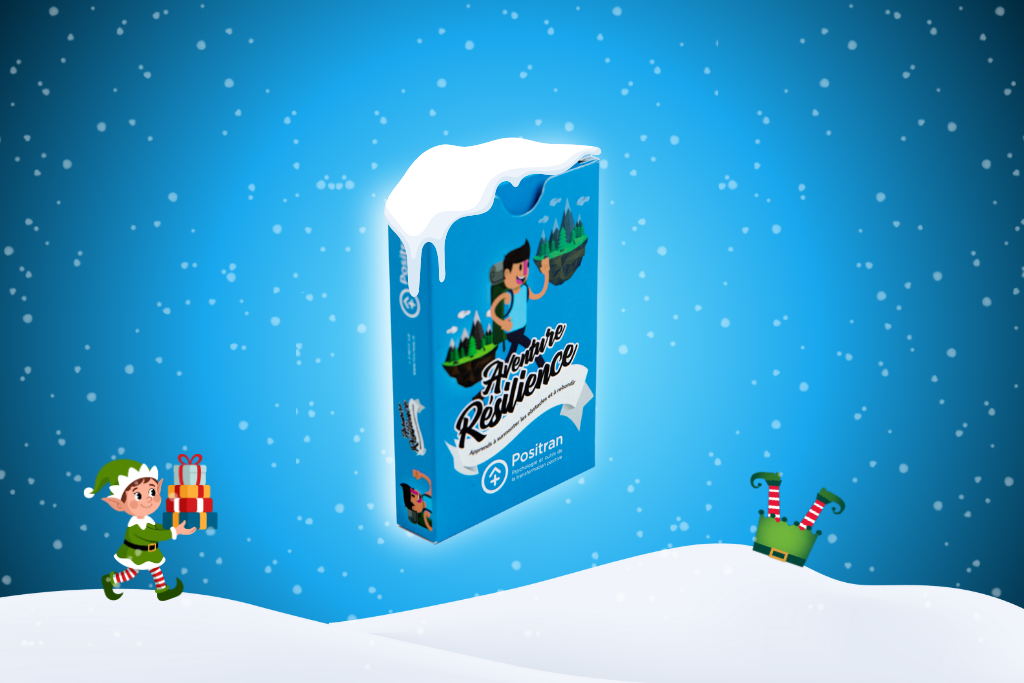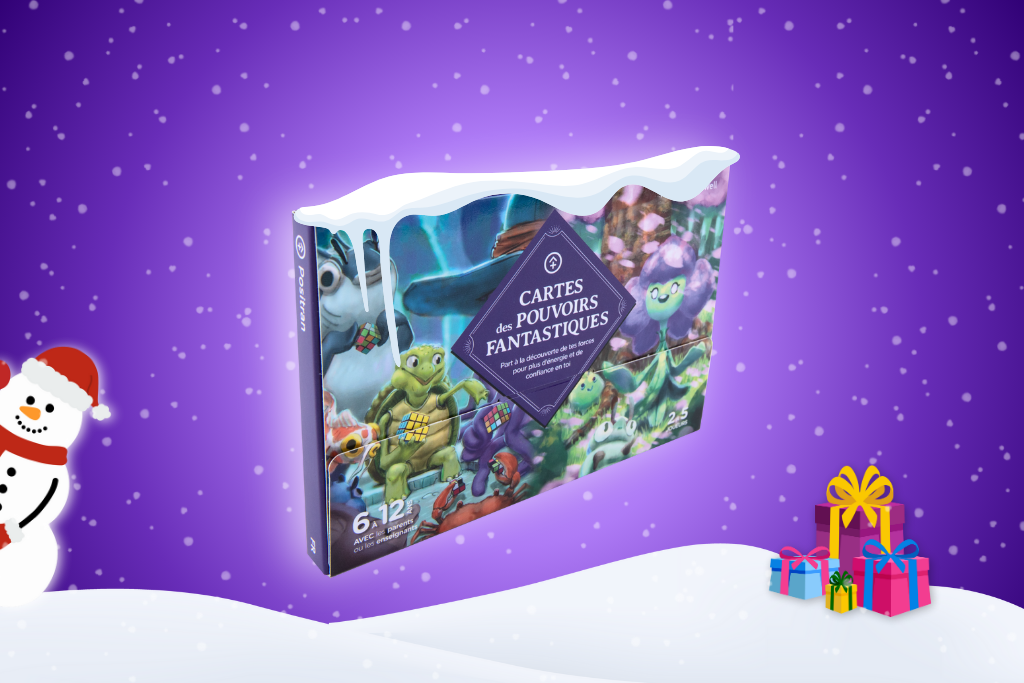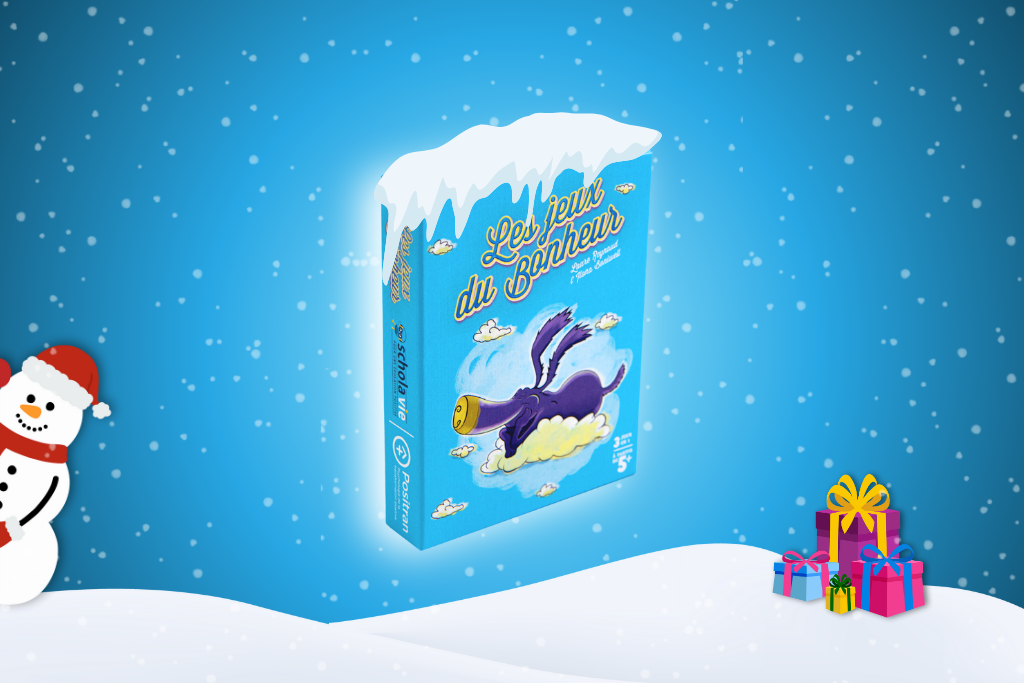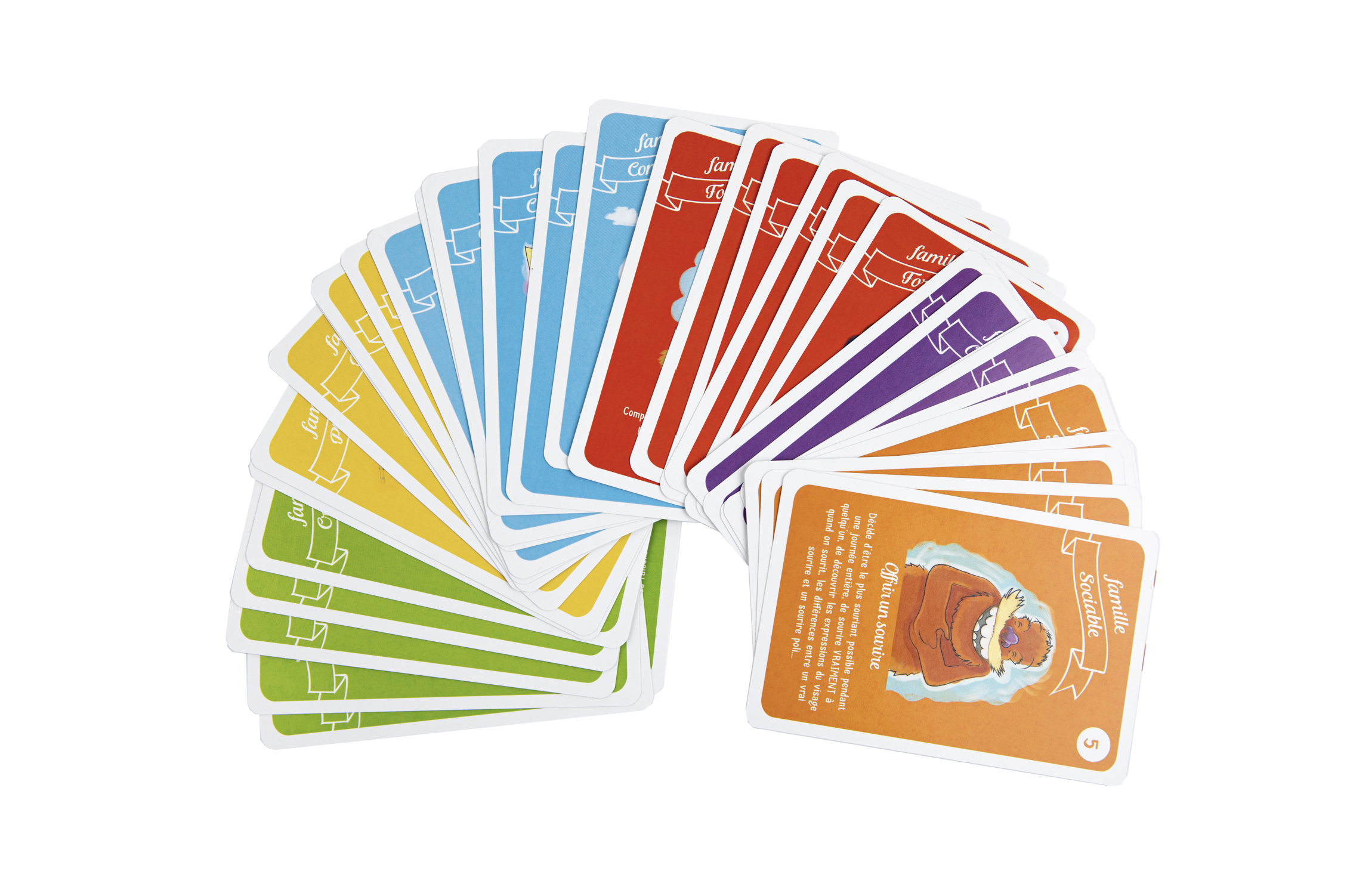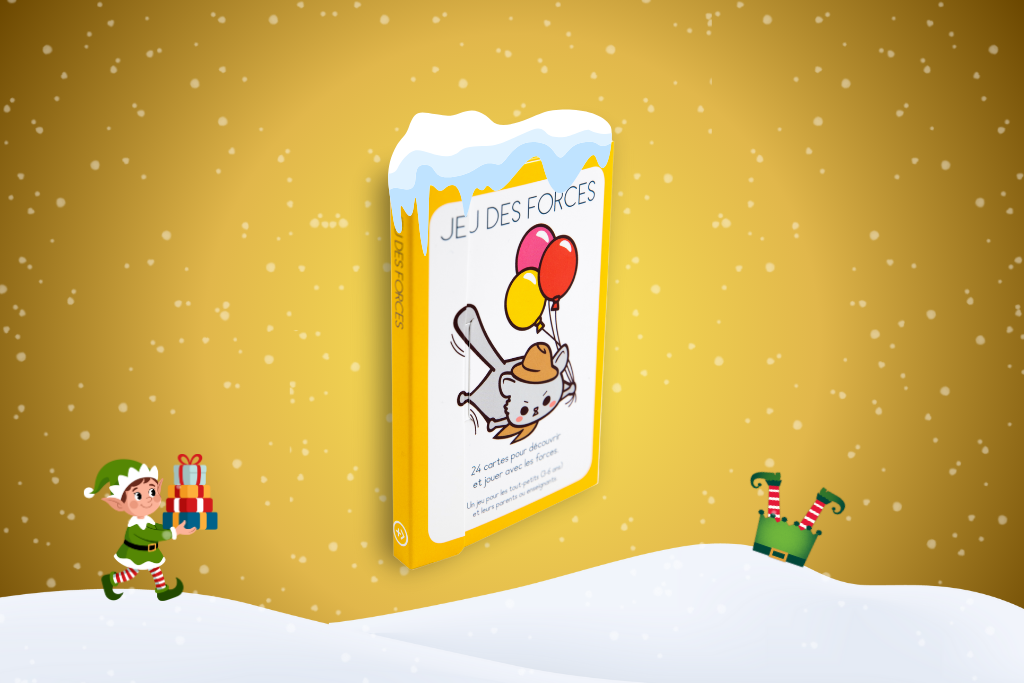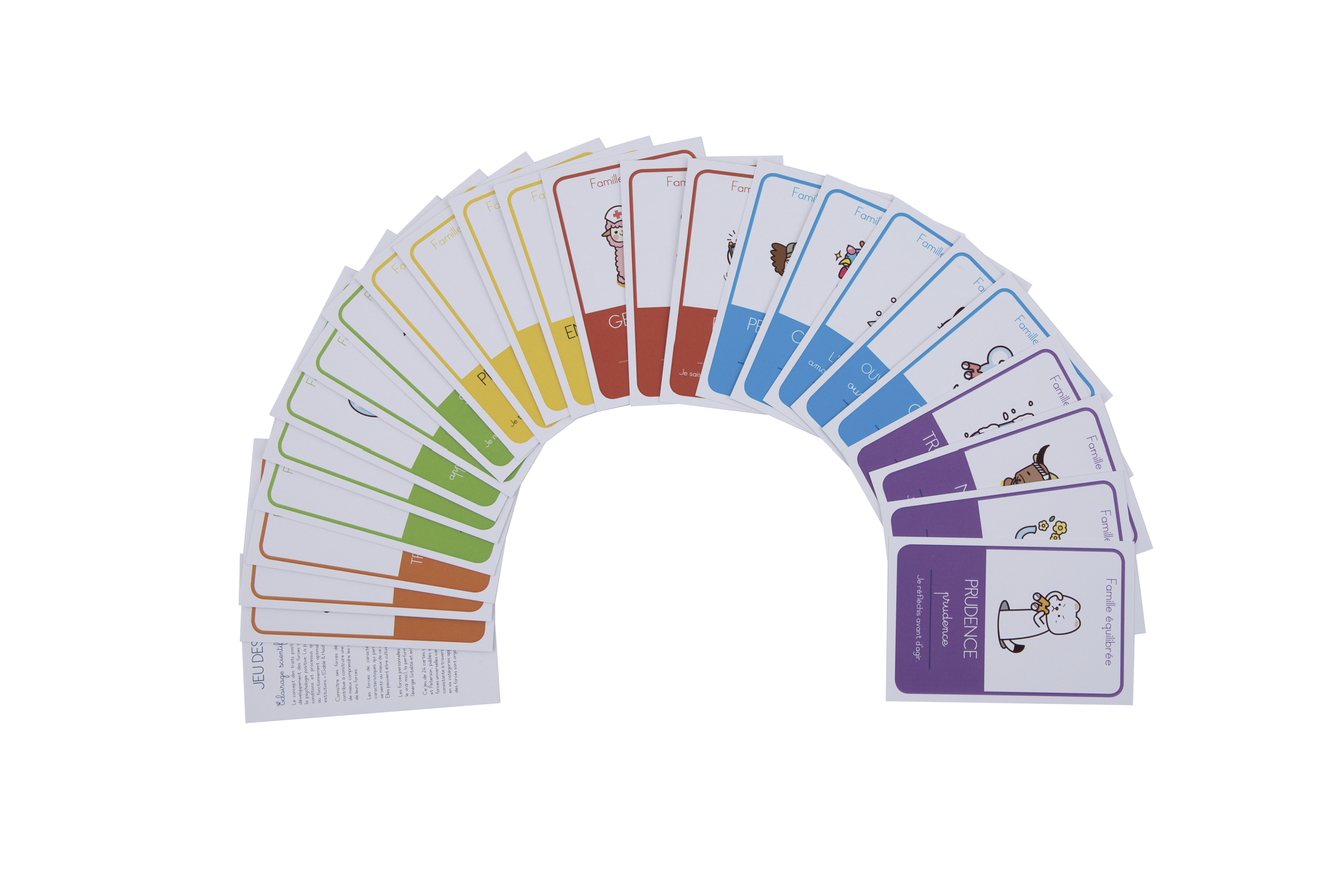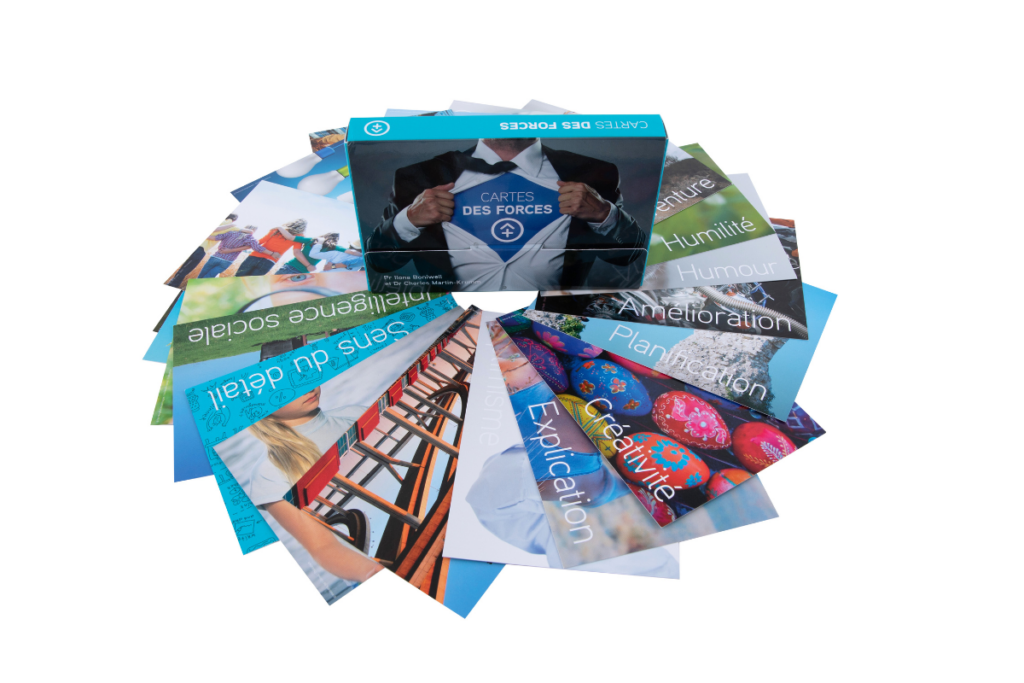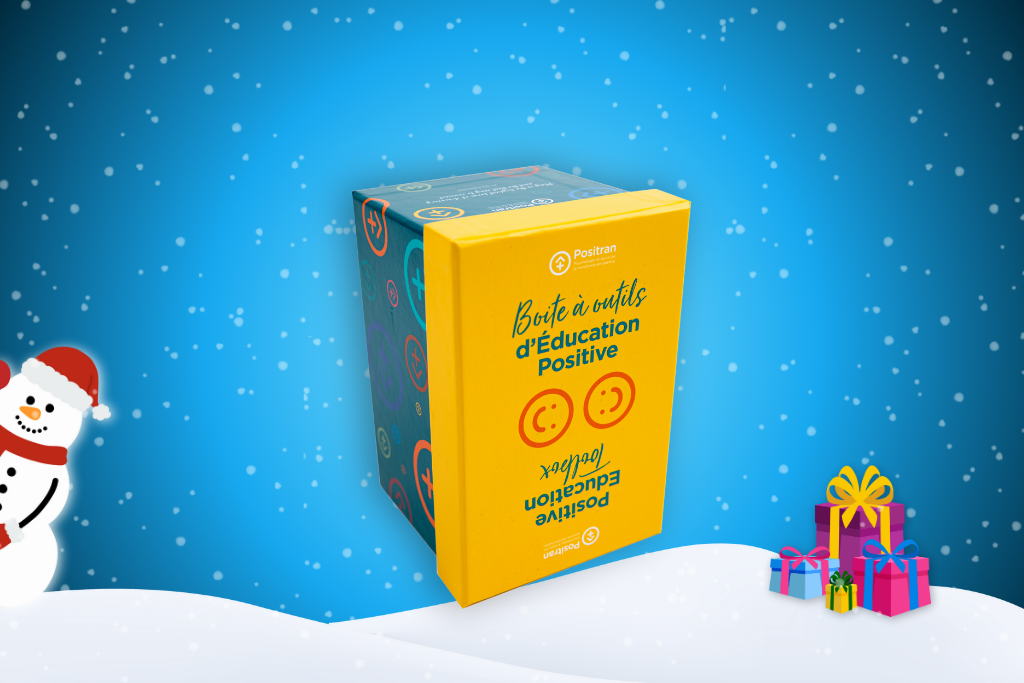
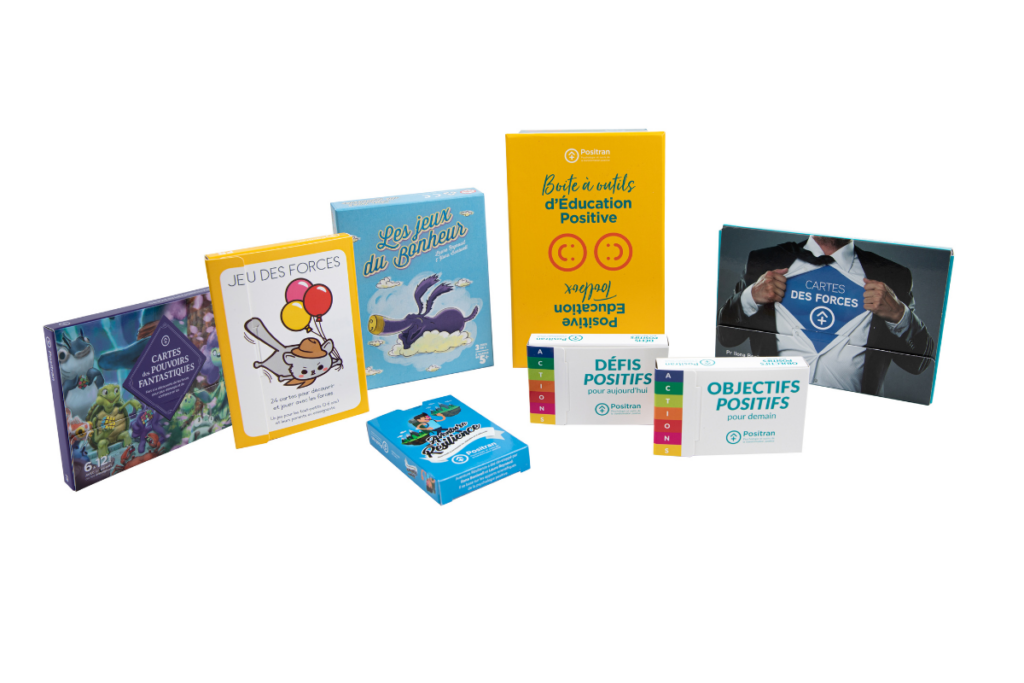
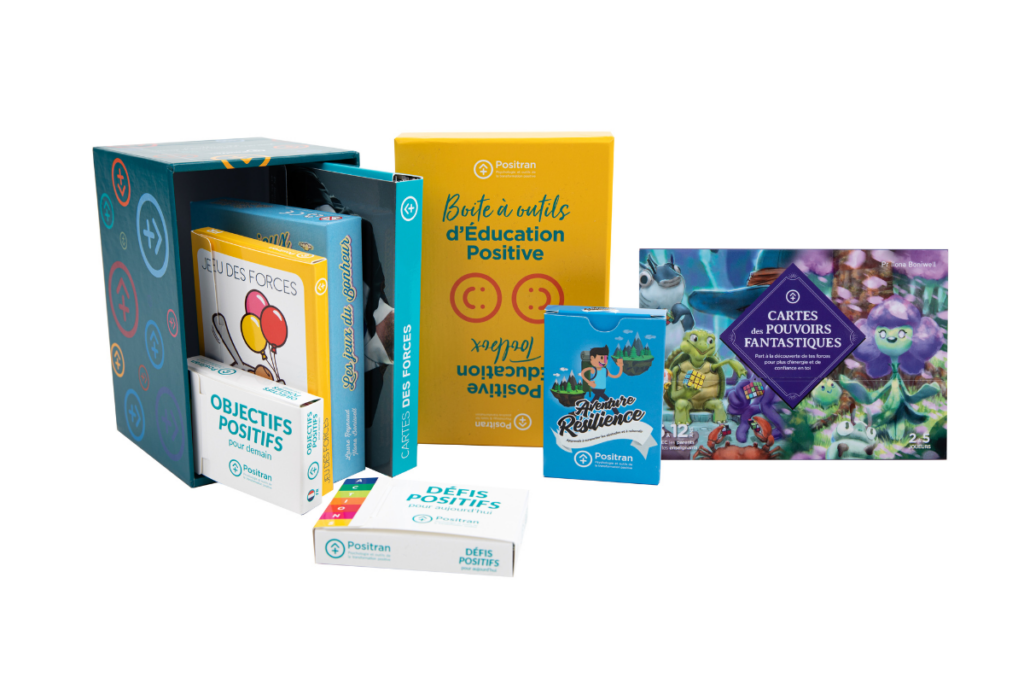
Positive Education Toolbox
Positran offers this Positive Education Toolbox to help children and teenagers fully recharge and move forward positively!
The Positive Education toolkit contains 6 games that will allow you to:
- Boosting their self-confidence and sharing their qualities with their families (for 3-6 year olds) with the Game of Forces
- Discovering their strengths for more energy and self-confidence (for ages 6-12) with The Cards of Fantastic Powers
- Give them fun and positive challenges with the game of Challenges and Positive Objectives
- Anchoring positive activities and playing the 7 families game with THE Games of Happiness
- Mobilizing their resources to help them bounce back better from certain situations using the SPARK model with the game Adventure Resilience
- Discover your strengths and those of your loved ones with the Force maps
Fill up on fun and positive activities with family or in a professional setting thanks to positive psychology!

Product Description
Positran offers a Positive Education toolbox to help children and adolescents recharge their batteries and move forward positively.
This set of 5 games accompanies you all year round:
Boost confidence with the Strengths cards;
Discover the forces with the Fantastic Worlds of Strengths;
Anchor positive activities with the Happiness Box ;
Mobilize resources via SPARC with Your Resilience Roadtrip;
Explore personal and family strengths with Let's Play Strengths.
Fun and scientific, ideal for families or professionals.
Who is it for?
Who can use the Positive Education Toolkit?
It is designed for you, teachers, parents and all those who work with children or adolescents up to 15 years old who wish to:
- Have fun
- Find positive activities
- Play while building confidence
- Share differently
Its use
How to use the games in the Positive Education toolbox?
- Game of Forces (for 3-6 year olds)
“Each of us has much more hidden within us than we have had the opportunity to explore.” (Muhammad Yunus)
Examples of activities and uses of the Game of Forces:
• Find my own strengths?
• Give strength to someone (a friend, a parent, a sister, a brother, etc.)
To identify and/or empower someone, we must be able to explain our choice.
For example: “I give you the strength of creativity because you make beautiful things with your hands!”
• Highlights of the day
What makes you feel like you're truly you? What are you most proud of? If you had to choose your strength of the day, what would it be? Why this strength and why today?
• Superhero Strengths
Alone or with your family, identify your favorite superhero. What do you think are their strengths? Which ones do you prefer? Then identify a difficult situation for you: what would your superhero do in this situation? How can you learn from them?
For more game ideas, you can download our guide here .
- Fantastic Powers Cards (for ages 6-12):
There are 24 different cards featuring 24 heroes, each with a power.
Each power symbolizes a universal character strength that has been identified by positive psychology researchers. Science knows that the more we understand and use our powers, the more we are ourselves, the more successful we are, and the more energized we feel!
THE GOAL OF THE GAME? Stock up on energy points to win!
You will be able to play 3 different games, designed with the help of psychologists Justine Chabanne and Raphaël Rebai, which can be played separately or in one large giant game by chaining them together.
Game 1 : Can you find each character's power? You too are the hero of your life; find your powers and complete challenges to activate them.
Game 2 : you will become a detective to discover the powers of the people around you.
Game 3 : Explore the worlds of these heroes. Here, you'll need to be precise and inventive, but also become a storyteller in order to master their powers. The powers are yours! Fill up on energy!
Challenges and Positive Goals:
Positive challenges for today:
Are you in a training room or classroom? Do you need an icebreaker game? Do you want to do an activity with family or friends?
Let's go, let's challenge each other!
In groups of 4 to 6 people, each person draws a CHALLENGE card, either at random or from the cards of the color of their choice.
Each color represents a category: Activity, Understanding & Creativity, Tranquility, Identity, Optimism, Us, Satisfaction.
Option 1: Each person presents their card to the other members of the group and everyone completes the challenge.
Option 2: Everyone chooses a card for another person and they must complete the challenge.
Positive goals for tomorrow:
Looking for a change in your daily life? Want to discover small activities you can incorporate into your life to improve your well-being?
Don't wait any longer and get started!
Each color represents a category: Activity, Understanding & Creativity, Tranquility, Identity, Optimism, Us, Satisfaction.
Some of the goals will require preparation or planning. Write them down in your calendars!
Idea 1: Give a GOAL card to someone who will have to complete the task written on the card within the next few days.
Idea 2: If your group can meet regularly, the game can continue at the next meeting.
- The Games of Happiness:
To be played with family, in class, with friends or as part of a positive psychology intervention, this game is accessible to children from 5 years old.
To guide you, we offer two practical ideas:
Idea 1: The game of 7 happy families – try to collect the greatest number of complete families and win the game.
Idea 2: A little moment to share – draw a card at random and do the activity suggested on it.
- Resilience Adventure:
Please note: to play, you will also need the SPARK wheel, which you can download here .
The rules of the game are included in the Resilience Adventure box. You will discover 4 different ways to play:
The wheel turns: to understand the thought process and identify its different components
It's Going to Hell!: To understand how we are sometimes victims of our perceptions and feelings. Resilience Adventure addresses different skills to progress towards more positive consequences.
Yes! It's back on track! To make this spiral positive, the game allows you to reveal, awaken, and strengthen your various skills and resources.
And in case of emergency?: for emergency situations – where everything is going too fast and we are unable to redirect the spiral towards the positive – we reverse the direction of the wheel which becomes CRAP: Awareness – Nothing (stop the reaction) – A ctivate (to activate an activity that will help manage emotions) – P erception (to question)
Force Cards:
So, how can you use these cards to identify, develop, and utilize strengths to their fullest potential? Check out an example that can be used in one-on-one conversations and sessions, within a family circle, with friends, and, of course, in many training and team-building situations. This activity is written with the end user in mind, so if you're a coach, trainer, or therapist, please note that by "you," we could also mean "your client."
* Strength Gym
In groups of 5 to 8 people, spread the 50 cards in front of you and choose three cards that you consider to be your greatest strengths. Take a look at the description and strengths questions on the back. Introduce yourself to the group by giving concrete examples of how you use these strengths (not just “I think I am a creative person”). Each group member takes turns doing this.
Next, name one or more other strengths for each other member of the group, giving them concrete examples of when you have seen them use that strength.
This exercise is contagious! It can also be very emotional.
Positran offers a Positive Education toolbox to help children and adolescents recharge their batteries and move forward positively.
This set of 5 games accompanies you all year round:
Boost confidence with the Strengths cards;
Discover the forces with the Fantastic Worlds of Strengths;
Anchor positive activities with the Happiness Box ;
Mobilize resources via SPARC with Your Resilience Roadtrip;
Explore personal and family strengths with Let's Play Strengths.
Fun and scientific, ideal for families or professionals.
Who can use the Positive Education Toolkit?
It is designed for you, teachers, parents and all those who work with children or adolescents up to 15 years old who wish to:
- Have fun
- Find positive activities
- Play while building confidence
- Share differently
How to use the games in the Positive Education toolbox?
- Game of Forces (for 3-6 year olds)
“Each of us has much more hidden within us than we have had the opportunity to explore.” (Muhammad Yunus)
Examples of activities and uses of the Game of Forces:
• Find my own strengths?
• Give strength to someone (a friend, a parent, a sister, a brother, etc.)
To identify and/or empower someone, we must be able to explain our choice.
For example: “I give you the strength of creativity because you make beautiful things with your hands!”
• Highlights of the day
What makes you feel like you're truly you? What are you most proud of? If you had to choose your strength of the day, what would it be? Why this strength and why today?
• Superhero Strengths
Alone or with your family, identify your favorite superhero. What do you think are their strengths? Which ones do you prefer? Then identify a difficult situation for you: what would your superhero do in this situation? How can you learn from them?
For more game ideas, you can download our guide here .
- Fantastic Powers Cards (for ages 6-12):
There are 24 different cards featuring 24 heroes, each with a power.
Each power symbolizes a universal character strength that has been identified by positive psychology researchers. Science knows that the more we understand and use our powers, the more we are ourselves, the more successful we are, and the more energized we feel!
THE GOAL OF THE GAME? Stock up on energy points to win!
You will be able to play 3 different games, designed with the help of psychologists Justine Chabanne and Raphaël Rebai, which can be played separately or in one large giant game by chaining them together.
Game 1 : Can you find each character's power? You too are the hero of your life; find your powers and complete challenges to activate them.
Game 2 : you will become a detective to discover the powers of the people around you.
Game 3 : Explore the worlds of these heroes. Here, you'll need to be precise and inventive, but also become a storyteller in order to master their powers. The powers are yours! Fill up on energy!
Challenges and Positive Goals:
Positive challenges for today:
Are you in a training room or classroom? Do you need an icebreaker game? Do you want to do an activity with family or friends?
Let's go, let's challenge each other!
In groups of 4 to 6 people, each person draws a CHALLENGE card, either at random or from the cards of the color of their choice.
Each color represents a category: Activity, Understanding & Creativity, Tranquility, Identity, Optimism, Us, Satisfaction.
Option 1: Each person presents their card to the other members of the group and everyone completes the challenge.
Option 2: Everyone chooses a card for another person and they must complete the challenge.
Positive goals for tomorrow:
Looking for a change in your daily life? Want to discover small activities you can incorporate into your life to improve your well-being?
Don't wait any longer and get started!
Each color represents a category: Activity, Understanding & Creativity, Tranquility, Identity, Optimism, Us, Satisfaction.
Some of the goals will require preparation or planning. Write them down in your calendars!
Idea 1: Give a GOAL card to someone who will have to complete the task written on the card within the next few days.
Idea 2: If your group can meet regularly, the game can continue at the next meeting.
- The Games of Happiness:
To be played with family, in class, with friends or as part of a positive psychology intervention, this game is accessible to children from 5 years old.
To guide you, we offer two practical ideas:
Idea 1: The game of 7 happy families – try to collect the greatest number of complete families and win the game.
Idea 2: A little moment to share – draw a card at random and do the activity suggested on it.
- Resilience Adventure:
Please note: to play, you will also need the SPARK wheel, which you can download here .
The rules of the game are included in the Resilience Adventure box. You will discover 4 different ways to play:
The wheel turns: to understand the thought process and identify its different components
It's Going to Hell!: To understand how we are sometimes victims of our perceptions and feelings. Resilience Adventure addresses different skills to progress towards more positive consequences.
Yes! It's back on track! To make this spiral positive, the game allows you to reveal, awaken, and strengthen your various skills and resources.
And in case of emergency?: for emergency situations – where everything is going too fast and we are unable to redirect the spiral towards the positive – we reverse the direction of the wheel which becomes CRAP: Awareness – Nothing (stop the reaction) – A ctivate (to activate an activity that will help manage emotions) – P erception (to question)
Force Cards:
So, how can you use these cards to identify, develop, and utilize strengths to their fullest potential? Check out an example that can be used in one-on-one conversations and sessions, within a family circle, with friends, and, of course, in many training and team-building situations. This activity is written with the end user in mind, so if you're a coach, trainer, or therapist, please note that by "you," we could also mean "your client."
* Strength Gym
In groups of 5 to 8 people, spread the 50 cards in front of you and choose three cards that you consider to be your greatest strengths. Take a look at the description and strengths questions on the back. Introduce yourself to the group by giving concrete examples of how you use these strengths (not just “I think I am a creative person”). Each group member takes turns doing this.
Next, name one or more other strengths for each other member of the group, giving them concrete examples of when you have seen them use that strength.
This exercise is contagious! It can also be very emotional.
